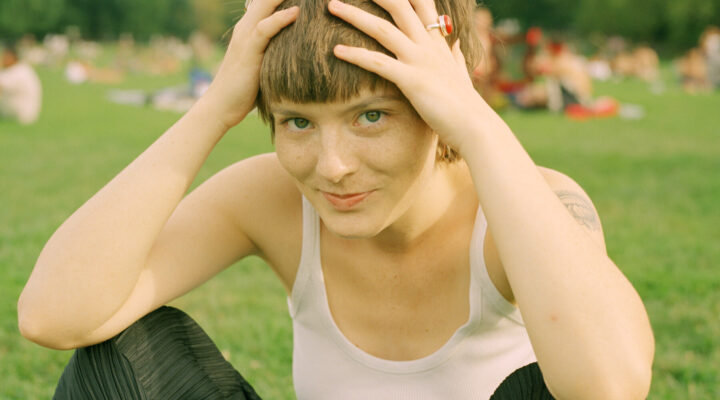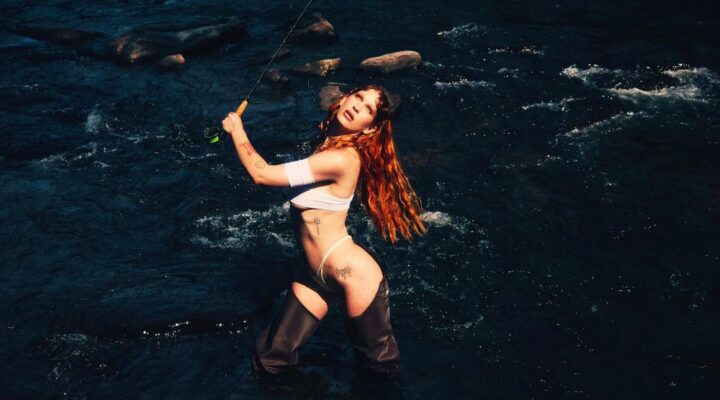An Interview with Perila
text by Callum McClean
photo's by Perila
Perila’s thoughts gush forth with free-flowing curiosity, a lot like her music. Her startlingly varied discography spans abstract, jittery soundscapes, shimmering walls of ambience, dubbed-out rhythm tracks, 20-minute-long piano experiments and something close to a beat tape – and that’s only counting the 13 uploads to Bandcamp since her 2021 debut album How Much Time It Is Between You and Me? Restless much? “I’m just following the flow”, she shrugs.
Ahead of her performance at the Concertgebouw for FIBER Festival 2023 – presented by Entrée and FIBER – Aleksandra Zakharenko shows no sign of slowing down. Despite insisting she has little control over her art, as we talk she’s already mapping out new paths for her performance: concocting ways to inspire devotional listening, break down barriers between her and her audience, and materialise nature in music. It’s a wild pace for an ambient musician, but then again Perila never seems content with staying in the background.

You’re about to set off on one of your annual field trips to the French countryside. What are you looking for when you go out to record in natural settings?
Out there I can connect with myself and the air. It feels like home, especially in this crazy, ever-changing world. Everything changes, but nature is something so confident and consistent throughout it all. In natural settings, there’s often a deafening, condensed silence—and more so the higher you go up the mountain. You can take that back to the city and get that feeling again. But I also want to expand to finding and using new natural sounds. Last night, for example, I had a show here in Berlin, and I wanted to present and combine the rawest sounds possible. They create their own song, and I don’t have to do anything but create a flow and help the music build.
“Anyone can hear beauty, but you have to tune in.”
How do you relate to those recordings once you’re back, when you’re composing or performing?
They bring me a lot of memories, but also new forms. I was in some caves in France, and when I came back I rebuilt those acoustics, processing them and making rhythms. I prefer to take rhythms from nature instead of programming them.
I’ve been thinking a lot about movement: the origin of sounds. I really like to bring those natural movements back into a sound: sound is movement, after all, but natural sounds move differently from something programmed very precisely. It’s all about that natural flow, that contradiction or juxtaposition to our city lives. By processing that, I’m constantly trying to heal myself and share it as something very accessible to everyone—though you have to train your ears to hear it! Sorry, I’m floating!

Please, float away! How you’re speaking right now reminds me of how your music moves. You can call it ‘experimental’, but it seems to me that you’re more interested in exploring: something more open-ended. Would you say your music is trying more to ask questions or to answer them?
“I like to ask questions and then have those questions be answers in themselves.”
I like to ask questions and then have those questions be answers in themselves. It’s an ongoing process. I make sonic diaries of what I’m observing and experiencing, externally and internally. I like to come up with dream ideas, real ideas, unreal ideas, concepts—and then live inside them for a while. Then those questions and thoughts surface as I make music. You start creating and you begin to see how your thoughts materialise. It’s sort of magical because I’m not doing much, I’m just transcending some energies. Oh my god, I sound very spiritual! I think I must still be vibing on yesterday’s concert… I’d been preparing so hard and I was pretty nervous, so now that it’s passed I can let that go, and it’s all creeping in! It was an intense experience of mutual listening and healing.
How does that work?
Well, we started with a deep listening experience, Pauline Oliveiros style. Then my set was super quiet—that’s my dream, and it’s super hard to do when you gig. The most beautiful thing was what Pauline Oliveiros calls “quantum listening”: this conscious presence of the listener or audience, when they’re so respectful and you can really feel them listening, so much so that it affects me in turn. It creates this dialogue or collaboration, and that changes the whole atmosphere and performance. But it has to be really intentional from the listener’s point of view. If you stop talking and you’re present, you can help weave this natural sound world together. It’s like in everyday life: anyone can hear beauty, but you have to tune in.
How close do you see that connection as being? You run the WET (Weird Erotic Tension) channel, and your music often gets pretty close to ASMR. Is it important for you to be intimate with your listeners?
“I think a lot in terms of gardens and growing sounds.”
It’s not intentional, but I think intimacy in my music is a reflection of my practice. One of the things I think about a lot now when I perform is the importance of being honest with myself. People really feel something if I go inside of myself and release something very deep and emotional, in a very honest way. Sharing something through the mediums of sound, words and voice is powerful as they’re connected to breath and the soul. I think being so honest with yourself is important for how you live your own life, but it also touches people.

How will that work in your performance at the Concertgebouw? Is it difficult to find intimacy in such large, formal spaces?
There’s this assumption with larger spaces that your performance also has to be big, that it has to fill the space. But I want to use quieter moments in my live sets, in combination with moments of intensity and climaxes. I want to present something very dynamic, including moments where you have to really tune in. I think a lot in terms of gardens and growing sounds: seeding sounds in space and letting them grow and evaporate, and letting the traces combine somehow. That’s unpredictable: people capture the dance of these sounds in a kind of improvised sonic performance – after all, I’m just initiating the sound waves. The Concertgebouw is a very focused listening space, which creates freedom for those moments.
I also want to cross that gap between performer and audience, where you’re looking at me and I’m making the music. It should be looser, with more connection, more humanity. I’m looking forward to trying all those new levels of engagement and testing new ground! That’s the beauty of performance: it’s unpredictable. There’s some preparation, but the end result is gonna be a dialogue, with the audience and with the space.
The event is billed as “an evening exploring the crossover of classical and contemporary electronic music”, but your music doesn’t feel classical at all. Why is that?
I think it comes down to always wanting to smash some boundary or explore something inside myself, and not wanting to be limited by these classical forms. I like to look for beauty in imperfection, to see how imperfection can be perfect. I’m always chasing that in my music. There’s that tendency towards perfectionism, whether with our appearances or our lives. So sometimes I feel of my own music that it sounds too raw or unfinished, but then I realise it’s maybe because the emotions it comes from were so raw. That’s unplanned—I don’t have much agency in that, but I do have interest, curiosity and inspiration from outside myself. I’m just following the flow.
Perila performs in Concertgebouw on May 11th, at the FIBER x Entrée Opening Concert. More info here.




